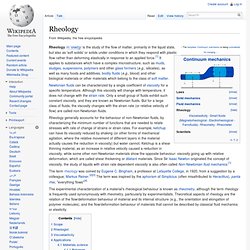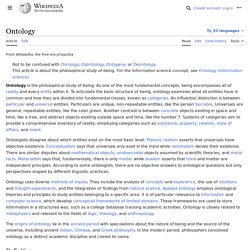

Rheology. Newtonian fluids can be characterized by a single coefficient of viscosity for a specific temperature.

Although this viscosity will change with temperature, it does not change with the strain rate. Only a small group of fluids exhibit such constant viscosity, and they are known as Newtonian fluids. But for a large class of fluids, the viscosity changes with the strain rate (or relative velocity of flow) are called non-Newtonian fluids. Rheology generally accounts for the behaviour of non-Newtonian fluids, by characterizing the minimum number of functions that are needed to relate stresses with rate of change of strains or strain rates.
For example, ketchup can have its viscosity reduced by shaking (or other forms of mechanical agitation, where the relative movement of different layers in the material actually causes the reduction in viscosity) but water cannot. Ontology. Study of the nature of being, becoming, existence or reality, as well as the basic categories of being and their relations Parmenides was among the first to propose an ontological characterization of the fundamental nature of reality.

Etymology[edit] While the etymology is Greek, the oldest extant record of the word itself, the New Latin form ontologia, appeared in 1606 in the work Ogdoas Scholastica by Jacob Lorhard (Lorhardus) and in 1613 in the Lexicon philosophicum by Rudolf Göckel (Goclenius). Epistemology. A branch of philosophy concerned with the nature and scope of knowledge Epistemology (; from Greek ἐπιστήμη, epistēmē, meaning 'knowledge', and -logy) is the branch of philosophy concerned with the theory of knowledge.

Epistemology is the study of the nature of knowledge, justification, and the rationality of belief. Much debate in epistemology centers on four areas: (1) the philosophical analysis of the nature of knowledge and how it relates to such concepts as truth, belief, and justification,[1][2] (2) various problems of skepticism, (3) the sources and scope of knowledge and justified belief, and (4) the criteria for knowledge and justification.